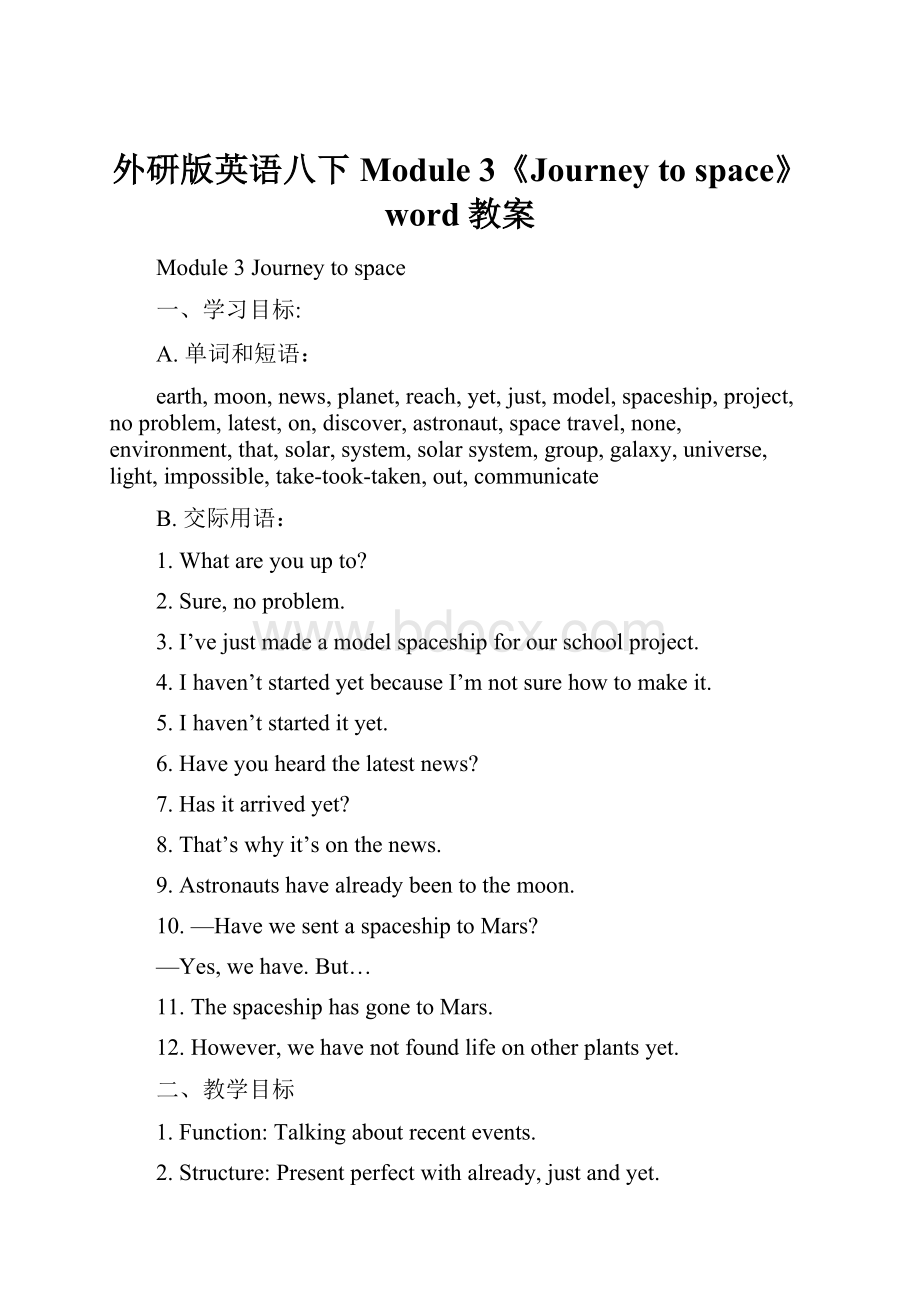外研版英语八下Module 3《Journey to space》word教案Word文档下载推荐.docx
《外研版英语八下Module 3《Journey to space》word教案Word文档下载推荐.docx》由会员分享,可在线阅读,更多相关《外研版英语八下Module 3《Journey to space》word教案Word文档下载推荐.docx(23页珍藏版)》请在冰豆网上搜索。

3.Skills:
1)Listeningforspecificinformation.
2)Talkingaboutspacetravel;
participatinginarole-play.
3)Readingandfindingoutinformationfromsimpletextsandchoosingthebesttitle.
4)Writingapassagetodescribethepicture.
4.Aroundtheworld:
Namesofthedaysoftheweek.
5.Task:
Makingaposteraboutspacetravel.
三、重点及难点:
1.Structure:
2.Tounderstandthedifferencebetweenhavebeentoandhavegoneto.
四、教学设计:
Unit1Hasitarrivedyet?
ⅠTeachingmodel
Listeningandspeaking
ⅡTeachingmethod
PWPapproach
ⅢTeachingaims
1.TounderstandPresentperfectwithalready,justandyet.
2.TounderstandtheconversationaboutthespacemissiontoMars.
3.Tounderstandthedifferencebetweenhavebeentoandhavegoneto.
ⅣTeachingObjectives
1.Keyvocabulary:
earth,moon,news,planet,reach,yet,just,model,spaceship,project,noproblem,latest,on,discover,astronaut,spacetravel
2.Keystructures:
ⅤTeachingaids
Taperecorder,OHP,video
ⅥTeachingSteps
Step1Warmingup
1.Enjoynewsreportandwatchavideo.
2.Showsomepicturestointroducethenewwords.
3.Learnthenewwords.
4.Readthenewwords.
Step2Listenandnumberthewordsasyouhearthem.
1.AskthestudentstoreadthewordsinActivity1.
earth,land,message,moon,news,planet,reach,scientist
2.Playtherecording.
3.Listenandnumberthewordsasyouhearthem.
4.Askthestudentstochecktheiranswerwithapartner.
5.Callbacktheanswerfromthewholeclassandchecktheanswer.
Step3Listenagainandcompletethenotes.
1.AskthestudentstoreadthenotesinActivity2.
newsaboutthetripto
(1)____________
journeyof
(2)__________months
hasnotsentbackany(3)___________yet
hopetofind(4)____________onMars
2.Listenagainandcompletethenotes.
3.Askthestudentstochecktheiranswerwithapartner.
4.Callbacktheanswerfromthewholeclassandchecktheanswer.
keys:
Marseightmessageslife
Step4Listenandread.
1.Showsomepictures,andaskthestudentstotalkaboutthem.
2.Askthestudentstoreadtheconversationsilently.
3.Playtherecordingandaskthestudentstolistenandreadtheconversation.
4.Readtheconversation.
5.Actitout.
6.Learn“EverydayEnglish”
1)Whatareyouupto?
2)Sure,noproblem.
Step5Nowanswerthequestions.
1.AskthestudentstoreadthroughthequestionsinActivity3.
1)WhatschoolprojecthaveDamingandTonygot?
2)HowdoesDamingfeelabouttheschoolproject?
3)WhatnewshasTonyheard?
4)HasanyonebeentoMars?
Why?
2.AskthestudentstoreadthroughtheconversationinActivity3again.
3.Answerthequestions.
4.Checkwithapartner.
5.Callbacktheanswersfromthewholeclass.
Keys:
Theyhavegotaprojectonspaceships.
He’snotsurehowtomakethemodel.
ThespaceshiptoMarshasreachedthere.
NoonehasbeentoMarsyet,becauseMarsisveryfaraway,muchfartherthanthemoon.
Step6CompletethepassageinActivity4.
1.AskthestudentstoreadthewordsintheboxinActivity4.
arrive,discover,planet,send,yet
2.AskthestudentstoreadthroughthepassageinActivity4.
Ontoday’snews,Tonyhasheardthatscientistshave
(1)_________aspaceshiptoMarsandithas
(2)________onthe(3)_________afterajourneyofseveralmonthsfromtheearth.Scientistshavenot(4)_________lifeonMars(5)________.AndnoastronauthaseverbeentoMarsbecauseitisveryfaraway.
3.Completethepassagewiththecorrectformofthewordsinthebox.
1.sent2.arrived3.planet4.discovered5.yet
6.Readthepassagetogether.
Step7Languagepoints.
你在做什么呢?
upto表示“正在干,从事着”。
常用在非正式常合中。
e.g.What’sheuptowithallthosebooksonthefloor?
Whatwereyouuptoyesterday?
Youdidn’tanswermyphone.
2.I’vejustmadethismodelofthespacestation.
这是我刚做的宇宙空间站的模型。
just常用在现在完成时的肯定句中,常放在助动词have/has的后面。
e.g.We’vejustseen/watchedthefilm.
3.Ihaven’tstartedityet.我还没有开始做呢。
yet表示“还(末)”,常用在现在完成时的否定句中,通常放在句末。
e.g.Wehaven’tfinishedourhomeworkyet.
4.Haveyouheardthelatestnews?
你听说过这个最新消息吗?
latestadj.最近的;
最新的
e.g.Thenewsisallaboutthelatestmeeting.这条消息是关于最近的会议的。
5.That’swhyit’sonthenews.这就是它为什么出现在新闻报导的原因。
That’swhy…这就是为什么……
e.g.That’swhytheydidn’tlikethemusic.这就是为什么他们不喜欢这个音乐。
onprep.在(播放)中;
关于……
e.g.What’sontheTV?
电视正在播放什么节目?
6.SohavetheydiscoveredlifeonMars?
所以他们在火星上发现生命了吗?
discoverv.发现;
找到
e.g.Thefactisthathedidnotdiscoverit.事实是他没有发现它。
7.Astronautshavealreadybeentothemoon.宇航员已经去过月球了。
already表示“已经”,常放在have/has之后,通常用于肯定句中。
e.g.Jackhasalreadyfinishedhishomework.
have/hasbeento表示曾经去过某地,但现在已经回到他的生活所在地。
e.g.They’vealreadybeentoSuzhoutwice.他们已经去过苏州两次了。
语法小结:
just用来表示“刚刚”,already用来表示“已经”,一般置于have/has之后,两者都用于肯定句;
yet用在否定句和疑问句,表示“还未”。
havebeento表示“去过某地”,但现在已经回来了;
havegoneto表示“去了某地”,现在不在这里(说话人所在地)
Step8Pronunciationandspeaking
1.Playtherecordingoncewithoutstopping.
2.Playtherecordingagainandaskthewholeclasstorepeat.
1)I’vejustmadeamodelspaceshipforourschoolproject.
2)Ihaven’tstartedyetbecauseI’mnotsurehowtomakeit.
3)Hasitarrivedyet?
4)Astronautshavealreadybeentothemoon.
3.Askthestudentstolistenandunderlinethewordsthespeakerstresses..
4.Nowlistenagainandrepeat.
Step9Workinpairs.
1.Makelistsofwhatwehaveandhavenotdoneinspacetravel.
WehaveWehavenot…
__________________________________________________________
___________________________________________________________
Key:
Wehave
Adoghastravelledinspace.
Menhavetravelledtothemoon.
SpaceshipshavetakenphotographsonMars.
Wehavenot
Wehavenotbuilthousesinspace.
AstronautshavenotbeentoMercury.
ScientistshavenotvisitedVenus.
2.TalkaboutspacetravelwiththelistsinActivity6.
—HavewesentaspaceshiptoMars?
3.Workinpairs.
Step10Exercises
A.中考链接:
()1.—Where’sBen?
(2011福州)
—He______totheteachers’office.He’llbebacksoon.
A.goB.hasgoneC.hasbeen
()2.—WillyoupleasegotoseethemovieGuanyinshanwithme?
—No,Iwon’t.I______italready.(2011聊城)
A.sawB.haveseenC.seeD.willsee
()3.Sheisn’tatthecinemanowbecauseshe_________thelibrary.(2011南宁)
A.hasbeentoB.havebeentoC.havegonetoD.hasgoneto
()4.—Jimisn’tintheclassroom.Whereishe?
—He_______totheteacher’soffice.(2011武汉)
A.willgoB.hasgoneC.hadgoneD.isgoing
()5.—I’dlikeyoutotellmesomethingaboutShenNongjia.
—I’msorry,butneitherJacknorI______there.(2013湖北孝感市)
A.havebeenB.hasbeenC.havegoneD.hasgone
1.B2.B3.D4.B5.A
B.完成句子:
1.我们已经到达上海。
We__________________Shanghai.
2.他刚刚做完这个模型。
He____________thismodel.
3.这个女孩在干什么?
What_____thisgirl____________?
4.—你曾经去过香港吗?
—是的。
—_____you___________HongKong?
—Yes,I_____.
5.他们听说过这个最近的新闻吗?
Havethey___________________?
1.havealreadyreached2.hasjustmade3.is,upto
4.Have,everbeento,have5.heardthislatestnews
Unit2Wehavenotfoundlifeonanyotherplanetsyet.
ⅠTeachingmodel
Readingandwriting.
ⅡTeachingmethod
Top-downapproach
ⅢTeachingaims
1.Listenforspecificinformation.
2.Talkaboutspacetravel;
3.Readandfindoutinformationfromsimpletextsandchoosethebesttitle.
4.Writeapassagetodescribethepicture.
ⅣTeachingObjectives
Keyvocabulary:
none,environment,that,solar,system,solarsystem,group,galaxy,universe,light,impossible,take-took-taken,out,communicate
Recorder,OHP,video
Step1Warming-up
1.ShowsomepicturestoreviewthetextofUnit1.
2.Showsomepictures.
3.Talkaboutthepictures.
4.Introducethenewwords.
5.Readthewordsaftertheteacher.
Step2Workinpairs.
1.EnjoyNewsReport.
2.ShowsomepicturestotalkaboutsomethingaboutShenzhou-9
3.AskthestudentstolookatthepictureinActivity1.
4.Workinpairs.
Shenzhou-9isamannedspaceship.
Step3Reading
1.Playtherecordingandlistentothetapecarefully.
2.Askthestudentstoreadthroughthepassage.
3.Choosethebesttitleforit.
1)Anyoneoutthere?
2)Lifeontheearth
3)Thesunandotherstars
4)Thestarsatnight
6.Readthete